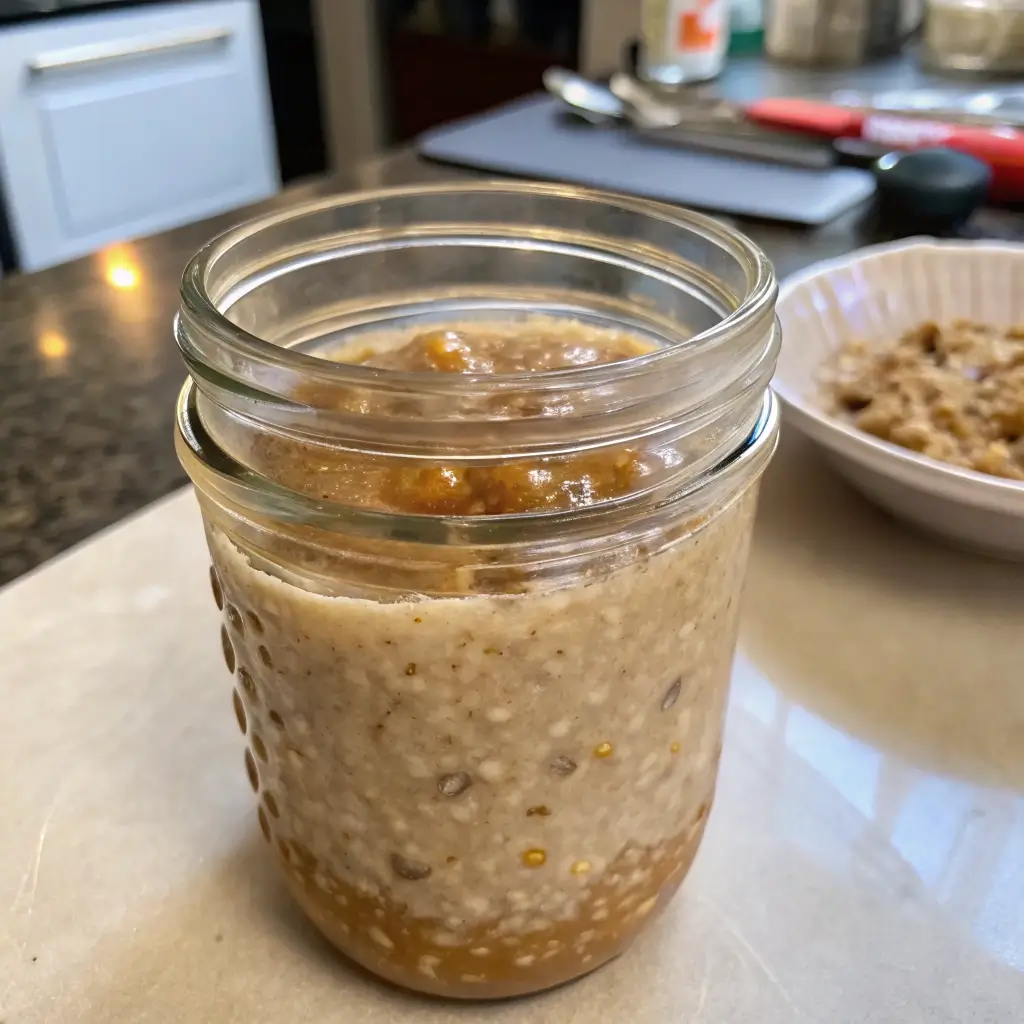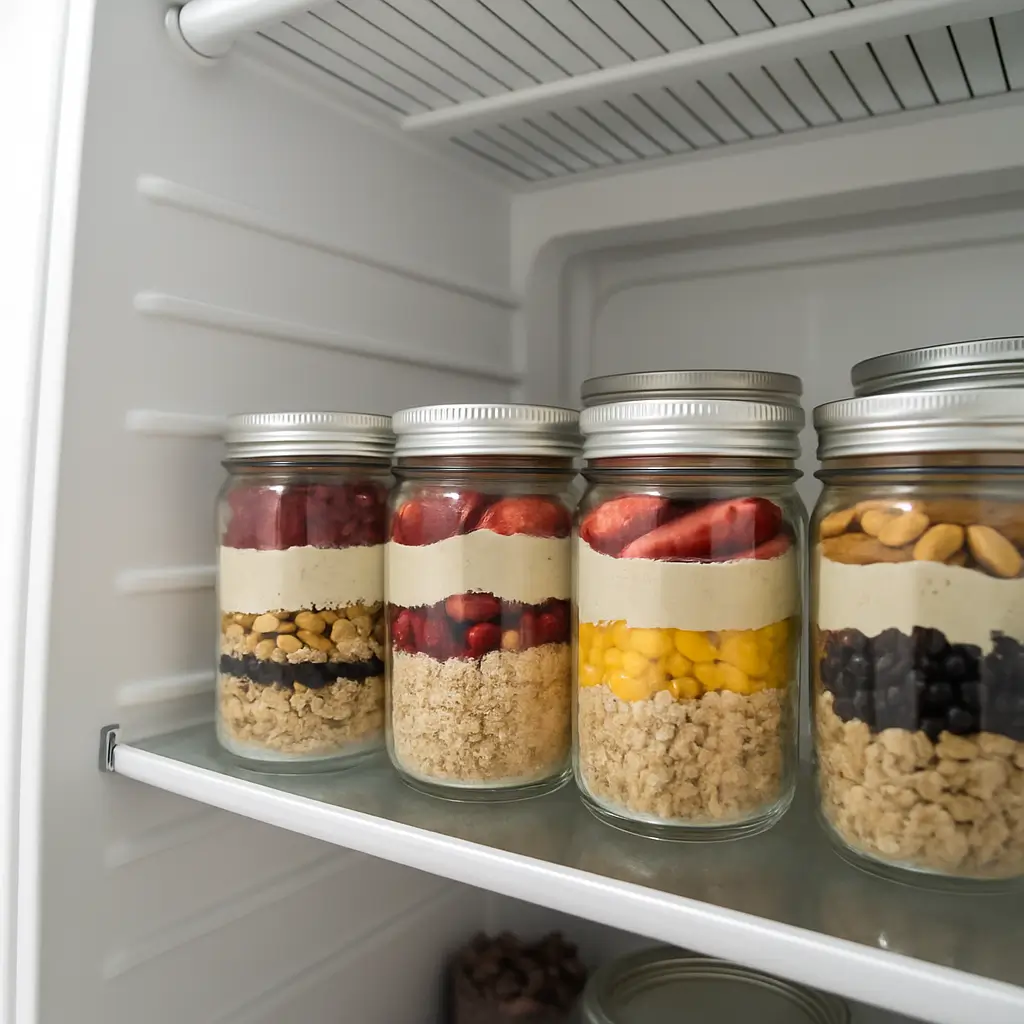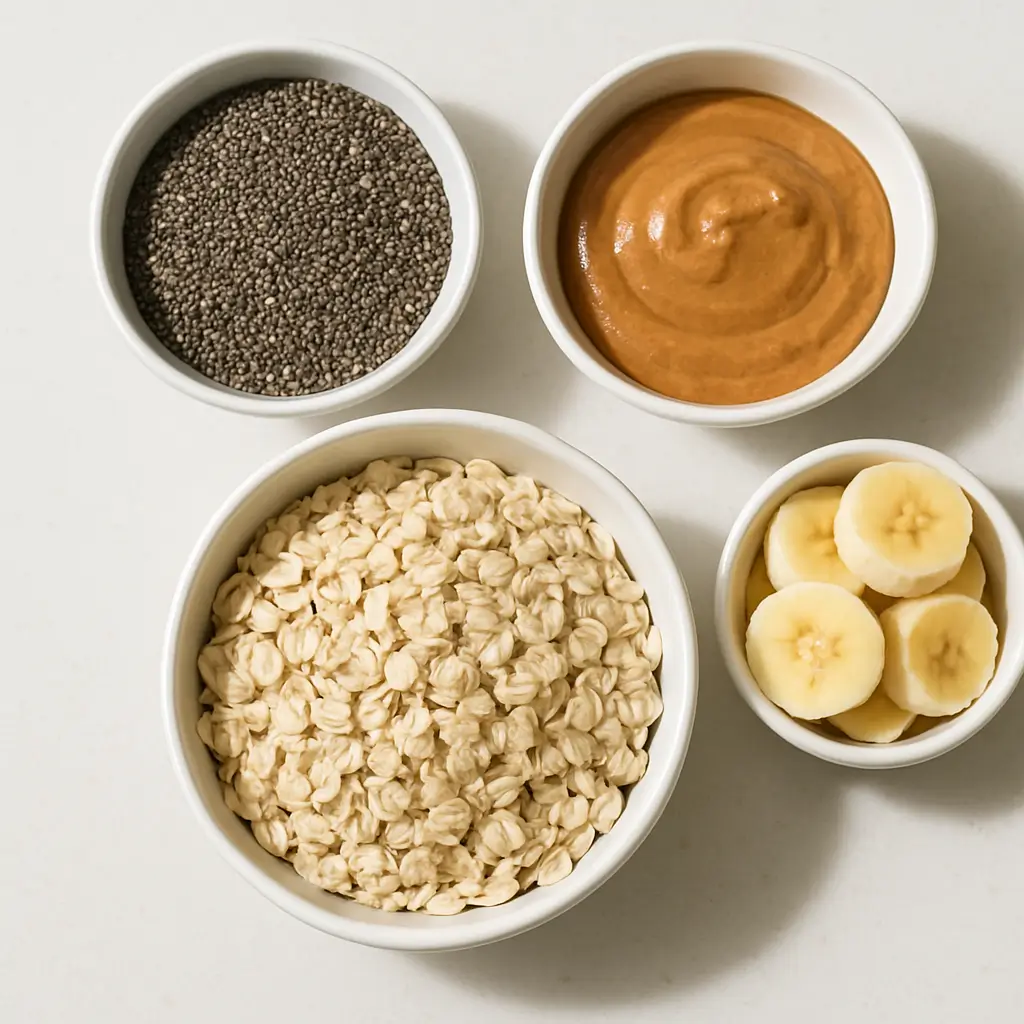Do overnight oats need to be refrigerated? It’s one of the most common—and important—questions people ask when prepping this popular breakfast. The short answer? Yes, they absolutely do. Whether you’re using dairy milk, almond milk, yogurt, or adding fruit, once liquid hits the oats, you’re working with a perishable mixture that must be kept cold.
In this article, we’ll answer the big question: do overnight oats need to be refrigerated, why that matters, and what actually happens if you don’t. You’ll also learn how long overnight oats can sit out, the best way to store them, and how to make them more nutritious without compromising food safety.
We’ll also explore how traditional soaking methods differ from modern overnight oat prep—and whether those ancestral tips still apply. Spoiler: if you’re not cooking your oats after soaking, the fridge is still your best friend.
Looking to start your oat game strong? Don’t miss our High-Protein Overnight Oats for Weight Loss with recipes, safety hacks, and storage tips for every lifestyle.
Table of Contents
Understanding Overnight Oats Storage
Why do overnight oats need to be refrigerated?
If you’ve been asking yourself do overnight oats need to be refrigerated, the short answer is yes—especially if your overnight oats contain perishable ingredients like milk, yogurt, nut milks, or fruit. Leaving them out overnight without refrigeration can cause harmful bacteria to develop quickly, leading to food spoilage or even food poisoning.
The reason overnight oats need to be refrigerated has to do with temperature and time. Once you mix your oats with liquid, they become a moist environment—perfect for bacteria to multiply if left at room temperature. That’s why refrigeration is the safest and most recommended way to store them.
When you prepare a jar of oats at night and include ingredients like dairy or almond milk, the USDA advises that you refrigerate within two hours. Otherwise, the mixture enters what’s called the danger zone—a temperature range between 40°F and 140°F where bacteria can double in number in just 20 minutes.
If you’re still wondering do overnight oats need to be refrigerated, think of it this way: if you wouldn’t leave milk out overnight, you shouldn’t leave your oats out either.
Don’t miss our full guide on refrigerating overnight oats the right way—it’s packed with easy-to-follow storage tips.
Still unsure do overnight oats need to be refrigerated in every situation? Head over to our Vision Recipes Facebook page and ask us directly—we love helping our community prep smarter, safer breakfasts.
Room temperature soaking: tradition vs. modern food safety
While refrigeration is the go-to method for most modern overnight oats recipes, there’s a twist. Traditional food preparation—like that practiced by our ancestors—involves soaking oats at room temperature. But here’s the key difference: those oats are typically soaked with warm filtered water and an acidic medium like whey, lemon juice, or apple cider vinegar, then cooked before eating.
So, if you’re using this ancestral method, do overnight oats need to be refrigerated? Not during the soaking stage—but only if you’re cooking the oats afterward. That cooking step kills any potential bacteria that could have developed during the warm soak.
On the flip side, if you’re eating your oats raw, cold, and directly from the jar (like most overnight oat fans do), then yes, overnight oats absolutely need to be refrigerated. Skipping refrigeration could result in spoilage, nutrient degradation, and serious health risks.
Learn more about High-Protein Vegan Overnight Oats that are not only delicious but safely stored.
How Long Can Overnight Oats Stay Out of the Fridge?
So really, how long can oats sit out—and do overnight oats need to be refrigerated?
If you’ve ever prepped oats and left them on the counter, you might be wondering: do overnight oats need to be refrigerated, or can they sit out safely until morning? This is one of the most misunderstood steps in overnight oats prep.
The truth is, overnight oats need to be refrigerated within 2 hours of being mixed. This rule applies whether you’re using dairy milk, nut milk, coconut milk, yogurt, or any kind of fresh fruit. Even plant-based options don’t make your oats shelf-stable once moisture is involved.
Why? Because once your oats are wet, they’re no longer just oats—they’re a perishable food mixture. And that mixture is highly vulnerable to bacterial growth if not kept below 40°F (the safe refrigeration zone). If they’ve been sitting out longer than 2 hours—especially overnight—they should be tossed.
Still wondering do overnight oats need to be refrigerated overnight? The answer is an absolute yes if you plan to eat them cold and uncooked the next morning.

Looking for safe, prep-ahead ideas? Don’t miss our high-protein overnight oats for weight loss—they’re fridge-friendly and perfect for busy mornings.
Signs your oats have gone bad (and why they needed to be refrigerated)
Even if you do refrigerate your overnight oats, they won’t last forever. Most properly stored oats stay fresh in the fridge for up to 5 days, depending on the ingredients you use. But things can still go south fast if you skip that refrigeration step. Here’s how to know if they’ve gone bad:
- Sour smell – If your oats smell “off” or like fermented dairy, don’t eat them.
- Change in color – Gray, green, or oddly dark colors mean bacterial activity or mold.
- Strange texture – If your oats become slimy, overly watery, or separate oddly, it’s time to toss them.
- Bitter or tangy flavor – This can mean fermentation has started without proper control (aka no refrigeration).
These issues are why do overnight oats need to be refrigerated isn’t just a casual question—it’s a food safety must-know.
Discover great ideas like Greek yogurt overnight oats that balance protein, texture, and long-lasting freshness—all when stored correctly in the fridge.
Why Do You Need to Refrigerate Overnight Oats?
Why exactly do overnight oats need to be refrigerated? Let’s break it down
You’ve heard the question a dozen times: do overnight oats need to be refrigerated? And the clear, science-backed answer is—yes, absolutely. Once you mix oats with moisture-rich ingredients like milk, yogurt, or almond milk, you’re not just creating a hearty breakfast—you’re also creating an ideal environment for bacteria to grow.
Do overnight oats need to be refrigerated to prevent this? Yes, they do. Moist oats combined with dairy or plant-based milks should always be stored below 40°F. That’s because the fridge slows down bacterial growth that would otherwise thrive at room temperature. The USDA has confirmed that perishable foods left out for more than 2 hours can quickly become unsafe, especially when it’s warm out.
So again, to keep your oats safe to eat, fresh in taste, and free from spoilage, overnight oats need to be refrigerated without question. Whether it’s almond milk or yogurt you’re using, if it would spoil outside the fridge, so will your oats.
Need a reliable method for oat storage? Don’t miss our article on overnight oats refrigerated the right way.
What happens if you don’t refrigerate your oats?
Now let’s say you didn’t refrigerate them. What happens? Here’s the truth—if you don’t refrigerate overnight oats, you’re exposing yourself to serious food risks. Without cold storage, the oats begin to ferment, especially when fruits or sweeteners are added. The texture can turn slimy, the smell can sour, and bacteria can multiply fast.
And again, let’s revisit the key question: do overnight oats need to be refrigerated even for just a few hours? The answer is yes. Even a few hours outside the fridge can cause problems. Some people believe using plant-based milk makes it okay to skip the fridge—but that’s a myth. Bacteria don’t care whether it’s cow’s milk or almond milk. The risk is real either way.
Here’s what else can happen when you don’t refrigerate your overnight oats:
- Spoiled dairy and curdled texture
- Mold formation from bacteria and excess moisture
- Digestive issues caused by hidden pathogens
- Sour or alcoholic smell from unintended fermentation
So when it comes to safe prep, do overnight oats need to be refrigerated? Yes. No exceptions—unless you plan to soak and then cook them, which is a different process entirely.
Looking for a storage-friendly protein boost? Try our How Much Protein is in Overnight Oats—designed specifically for refrigeration.
What Happens If You Don’t Refrigerate Overnight Oats?
Here’s what really happens if you skip refrigeration
Still wondering do overnight oats need to be refrigerated, or can you get away with leaving them out? Let’s be honest—some of us have prepped oats, left them on the counter overnight, and hoped for the best. But here’s the truth: when overnight oats are not refrigerated, they can become unsafe in just a few hours.
Yes, even if you used almond milk. Yes, even if your kitchen “felt cool.” Once those oats absorb liquid and sit unrefrigerated, you’re giving bacteria exactly what they want: moisture, temperature, and time.
So, do overnight oats need to be refrigerated to avoid spoilage and foodborne illness? 100% yes. Bacteria like Listeria, E. coli, and Salmonella don’t care what milk you used—they’ll multiply regardless.
Want to keep your oats fresh, safe, and delicious? Don’t forget—overnight oats need to be refrigerated immediately after mixing.
Check out Greek yogurt overnight oats for a great example of high-protein oats that stay fresher longer in the fridge.
Top 5 things that happen when overnight oats aren’t refrigerated
When you ignore food safety guidelines and skip the fridge, here’s what can go wrong:
- Spoiled milk or yogurt – Even plant-based milk can sour fast at room temp.
- Slimy texture – Bacteria and excess moisture cause oats to turn mushy and off-putting.
- Fermentation – Fruit sugars may begin to ferment, causing a bubbly or “boozy” smell.
- Mold growth – If oats are stored in a warm, dark space, mold can start developing quickly.
- Food poisoning – You might not see the bacteria, but it’s there—and it can lead to cramps, nausea, or worse.
So again, if you’re asking do overnight oats need to be refrigerated, the answer is a firm yes—unless you’re following a specific, traditional soaking method that ends with cooking (more on that in Part 6).
Want to safely prep for the week? Discover great ideas like creamy overnight oats with protein powder—perfectly built for fridge storage.
Best Practices for Refrigerating Overnight Oats
How to refrigerate overnight oats the right way
So we’ve answered it over and over: do overnight oats need to be refrigerated? Absolutely—and now, it’s time to talk about how to do that the right way.
If you want your oats to stay fresh, safe, and delicious, proper refrigeration is a must. It’s not enough to toss the jar in the fridge—you also need to store it in a clean, airtight container, ideally glass with a tight-sealing lid. Why? Because even a little air exposure can speed up spoilage and change the texture.

And when you refrigerate properly, your oats can stay good for up to 5 days. So if you’re a meal-prepper asking do overnight oats need to be refrigerated all week long, the answer is yes—but when stored right, they’ll stay perfectly tasty until Friday.
Looking for inspiration? Don’t miss our overnight oats refrigerated recipe designed specifically for longer fridge life.
Storage containers and temperature tips
To keep your oats fresh and safe, follow these basic but essential storage rules:
- Use glass jars or BPA-free containers – They seal tightly and don’t absorb odors.
- Keep your fridge at or below 40°F – Anything higher and bacteria can start to grow.
- Label with the prep date – Helps you track freshness and avoid waste.
- Store oats on a middle shelf – This spot stays cold and consistent (not the fridge door!).
So if you’ve been asking do overnight oats need to be refrigerated, now you know that how you refrigerate them matters too.
Best Storage Practices for Overnight Oats
| Step | What to Do | Why It Matters |
|---|---|---|
| Refrigerate within 2 hours | Place oats in the fridge right after mixing | Prevents bacterial growth |
| Use airtight containers | Mason jars or glass meal-prep containers | Seals out air and moisture |
| Don’t open and reclose too often | Store in single-serve portions | Reduces contamination |
| Keep the fridge at 40°F or below | Use a thermometer to monitor temperature | Slows spoilage and bacteria growth |
Check out high-protein overnight oats for weight loss if you’re prepping for the week and want something satisfying that stores well.
How long do overnight oats last in the fridge?
Even when you do everything right, you still need to know when to eat your oats. Here’s a quick breakdown:
- Oats with dairy or yogurt: 3–4 days max for the best flavor and safety.
- Oats with almond milk or oat milk: Up to 5 days if stored airtight.
- Oats with fruit (like banana or berries): Best within 2–3 days, as fruit can ferment or break down.
So, when someone asks do overnight oats need to be refrigerated, it’s not just about keeping them cold—it’s about preserving taste, texture, and nutrients for as long as possible.
Nutritional Boost — Soaking vs. Cooking Oats
Do overnight oats need to be refrigerated if you’re soaking them for nutrition?
There’s a lot of confusion about when exactly do overnight oats need to be refrigerated. Especially when people start talking about traditional soaking methods using warm water and acidic mediums like lemon juice or whey. So let’s settle it: do overnight oats need to be refrigerated when you’re soaking them for nutritional benefits?
Yes—unless you’re planning to cook them afterward.
Here’s the difference: traditional soaking methods allow oats to break down anti-nutrients like phytic acid, which can block your body’s ability to absorb key minerals. This soaking process is often done at room temperature, using filtered warm water and something acidic (like apple cider vinegar, kefir, or whey). But—and here’s the key—those oats are always cooked after soaking.
So, do overnight oats need to be refrigerated when using this ancestral method? Not during the soak, no. But if you’re going to eat them cold and uncooked, then yes, overnight oats need to be refrigerated without question. The cooking step in traditional prep kills off bacteria. Without cooking, refrigeration is your only defense.
Need a recipe that respects both safety and tradition? Learn more in our detailed guide on how to safely refrigerate overnight oats.
Why traditional soaking works—but isn’t a free pass
Many people assume that adding lemon juice or whey means they can leave their oats out all night. That’s only half true. If you follow proper traditional soaking and cook the oats the next day, that’s fine. But if you’re planning to eat them raw from the jar—then no, it’s not safe. In that case, do overnight oats need to be refrigerated? Yes, 100% yes.
This myth gets a lot of people sick. Just adding something acidic doesn’t guarantee safety if you skip refrigeration. Especially with dairy or fruit involved, overnight oats need to be refrigerated to stay safe and fresh.
Explore more :
Here are some similar recipes related to protein overnight oats :
Do Overnight Oats Go Bad Quickly?
How fast do overnight oats spoil—and do overnight oats need to be refrigerated to stay fresh?
If you’ve ever opened a jar of oats and caught a whiff of something… funky, you’ve probably asked yourself again: do overnight oats need to be refrigerated, or did I mess something up?
Here’s the deal—overnight oats go bad faster than most people think, especially when stored improperly. Even in the fridge, they can spoil within a few days depending on the ingredients. But outside the fridge? Spoilage can happen within hours.
So yes, do overnight oats need to be refrigerated right after mixing? Absolutely. Any delay increases your chances of bacterial growth, sour smells, and ruined texture.
If you’re not refrigerating immediately, your oats are sitting in the bacteria breeding zone. Especially with ingredients like bananas, berries, nut milk, or dairy, your oats can go from perfect to gross surprisingly fast.
Still wondering do overnight oats need to be refrigerated overnight or just before eating? The answer is both—they need refrigeration as soon as they’re mixed and should be kept cold until you’re ready to eat them.
Need a go-to recipe that lasts well? Try our Greek yogurt overnight oats—they’re fridge-tested and meal-prep approved.
What causes overnight oats to spoil quickly?
Even if you refrigerate your oats properly, certain ingredients can cause them to spoil faster. Here are the main spoilage triggers:
- Fresh fruit (like bananas or strawberries) – These break down quickly and start fermenting.
- Dairy or yogurt – Needs to stay cold or it’ll sour within hours.
- Improper sealing – If your container isn’t airtight, outside bacteria can sneak in.
- Repeated temperature changes – Taking oats in and out of the fridge? That’s a spoilage risk.
So, do overnight oats need to be refrigerated even if you plan to eat them the next morning? Yes. Refrigeration slows everything down—bacterial growth, oxidation, and fermentation. It keeps your oats safe and your morning stress-free.
Don’t miss our full guide on refrigerating overnight oats to learn how long oats with different ingredients stay fresh.
Looking for make-ahead oats that stay fresh? Check out our high-protein overnight oats for weight loss—a great choice for batch prep.
How to Store Overnight Oats Properly
Do overnight oats need to be refrigerated—and how can you store them the right way?
You already know the answer: do overnight oats need to be refrigerated? Yes—no shortcuts, no exceptions. But now, let’s go deeper into how to actually store them for max freshness and safety.
The biggest mistake people make isn’t just forgetting to refrigerate—it’s storing oats incorrectly even inside the fridge. So if you want your overnight oats to last more than a day or two, you need a few smart storage habits.
First, let’s go over the basics. Always store your oats in a clean, airtight container. Preferably, use glass jars with tight lids. Avoid plastic containers unless they’re BPA-free and leakproof. Second, label your jars with the date you made them—don’t guess later.
And yes, just to be crystal clear—do overnight oats need to be refrigerated immediately after mixing? 100% yes. Whether you plan to eat them tomorrow or three days from now, they go in the fridge as soon as they’re made.
Looking for a recipe that stores well all week? Don’t miss our creamy overnight oats with protein powder—they’re made to last and built for meal prep.
Can you freeze overnight oats? Yes—and here’s how
If you’re prepping for the long haul, freezing is a great option. You can batch prep several servings, freeze them, and thaw overnight in the fridge. Just make sure you don’t freeze oats in glass jars unless they’re freezer-safe (you don’t want broken glass at breakfast).
To freeze oats:
- Portion oats into individual servings.
- Use freezer-safe containers or silicone pouches.
- Leave room at the top for expansion.
- Label with date and ingredients.
- Freeze up to 2 months.
When you’re ready to eat, just move a container to the fridge the night before. Thawed oats should still be consumed within 1–2 days.
So if someone asks, do overnight oats need to be refrigerated if frozen, here’s your response: yes, once they’re thawing—they must stay refrigerated to stay safe.
Check out peanut butter protein overnight oats for a freezer-friendly flavor that holds up well over time.
Pro Tips for Making Overnight Oats Healthier
Want better nutrition and safety? Do overnight oats need to be refrigerated even when using healthy add-ins?
Let’s wrap things up with something you’ll love—simple ways to upgrade your overnight oats. But even when boosting nutrition, one golden rule stays the same: do overnight oats need to be refrigerated? Yes, they always do. Whether you’re adding protein powder, flaxseeds, or almond butter—overnight oats need to be refrigerated to stay safe and fresh.

Even “dry” ingredients like chia seeds and oats become perishable once they’re mixed with liquid. So when you’re adding healthy fats, probiotics, or sweeteners, nothing changes: do overnight oats need to be refrigerated? Yes. That step keeps your nutrition high and your breakfast worry-free.
Looking for visual ideas to upgrade your overnight oats? Follow us on Pinterest @VisionRecipes for safe storage tips, nutritional combos, and aesthetic meal-prep boards you’ll want to pin.
Top nutrition-enhancing add-ins (that still require refrigeration)
- Acidic liquids like kefir, whey, or yogurt – These help break down phytic acid and promote gut-friendly bacteria—but must be refrigerated.
- Chia seeds and flaxseeds – Add fiber and omega-3s. But once soaked, they absorb moisture, making refrigeration a must.
- Protein powder – Great for staying full longer, but once mixed into a wet base, it shortens shelf life. Still wondering do overnight oats need to be refrigerated when using protein powder? Yes, especially!
- Nut butters – Rich in fats and flavor. But don’t let them sit out overnight—bacteria still love that environment.
- Bananas or berries – Fresh fruit boosts flavor and antioxidants, but also spoils fast. These make refrigeration even more important.
If your oats contain any moisture—especially from dairy, fruit, or acidic liquids—do overnight oats need to be refrigerated? Every single time.
Looking for delicious, balanced prep ideas? Try our high-protein overnight oats for weight loss—perfect for energy, fat loss, and safe storage.
Do overnight oats need to be refrigerated?
Yes, overnight oats must be refrigerated. Leaving them out for more than 2 hours can lead to rapid bacterial growth, making them unsafe to eat.
How long can overnight oats stay out of the fridge?
Overnight oats should not be left out for more than 2 hours. After that, they enter the “danger zone” where bacteria multiply rapidly.
Why do you need to refrigerate overnight oats?
Once oats are mixed with liquid—whether dairy or plant-based—they become perishable. Refrigeration slows bacterial growth and preserves texture and flavor.
Do overnight oats go bad quickly?
Yes, if not refrigerated or stored properly. Even in the fridge, they last 3–5 days depending on the ingredients. Without refrigeration, spoilage can start within hours.
How do I store my overnight oats?
Use airtight containers and refrigerate them immediately after mixing. Label them with the prep date and keep the fridge at or below 40°F.
Conclusion
So, do overnight oats need to be refrigerated? We’ve said it, proven it, and now you know: yes, they do. Whether you’re prepping a high-protein breakfast, soaking oats for nutrition, or adding fresh fruit, refrigeration is non-negotiable.
From food safety to flavor, the fridge keeps your oats fresh, safe, and satisfying. You now know how to store them properly, how long they last, what to avoid, and even how to freeze them.
Looking for more fridge-ready oat recipes? Don’t miss our roundup of overnight oats refrigerated ideas.
